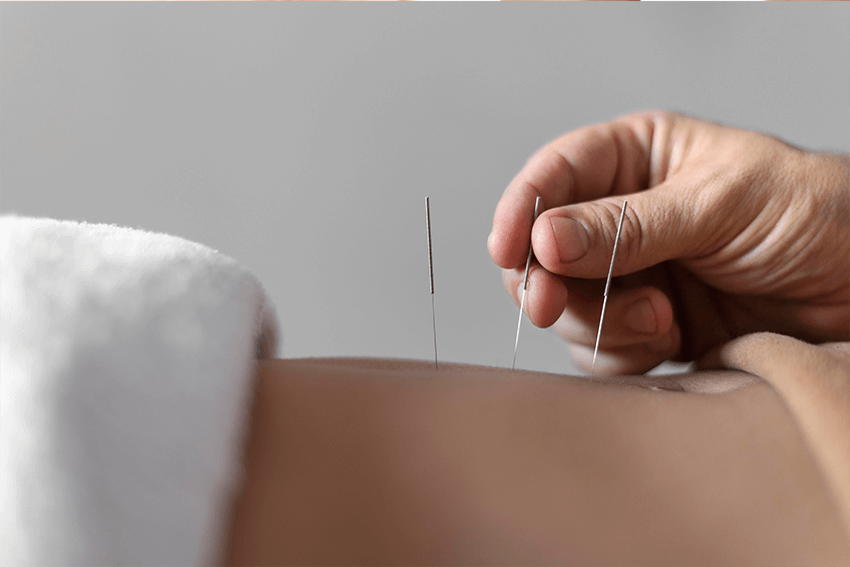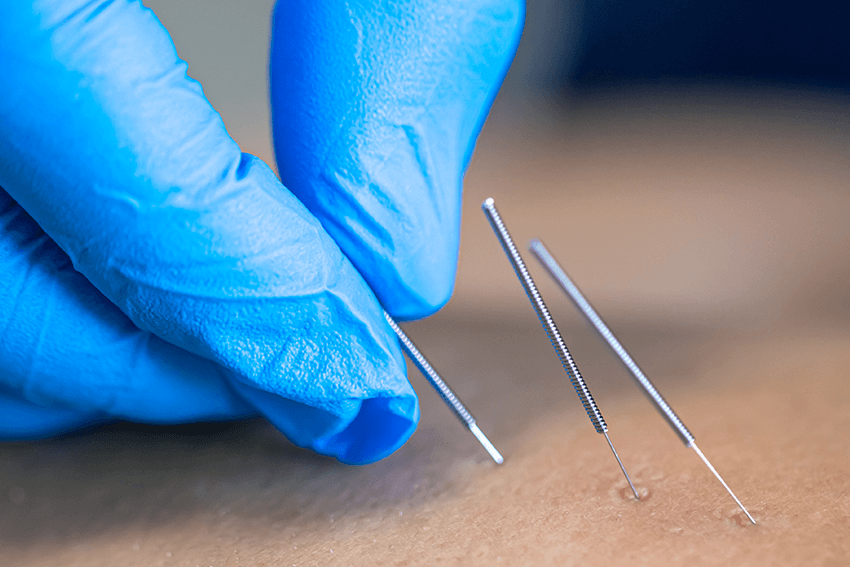Acupuncture Treatment by Healthy Choice Massage Therapy Clinic
Acupuncture helps support your health in the management of pain, anxiety, stress, chronic conditions, migraines, digestive disorders, sleep management, inflammation reduction, and enhancement of the immune system.
Acupuncture is a form of alternative medicine where thin needles are inserted into specific points on the body to stimulate energy flow and promote healing. This practice has been used for centuries in traditional Chinese medicine and is now widely accepted in Western medicine as well. By targeting these specific points, acupuncture can help relieve chronic pain by releasing endorphins, which are the body’s natural painkillers, and improving blood circulation to reduce inflammation.


Pain relief
Acupuncture has been shown to be effective in treating chronic pain, including back pain, neck pain, osteoarthritis, and headaches.
Digestive disorders
Acupuncture can help relieve symptoms of digestive disorders such as irritable bowel syndrome (IBS), gastroesophageal reflux disease (GERD), and constipation.
Stress and anxiety
Acupuncture can help reduce stress and anxiety by promoting relaxation and balancing the body’s energy.
Fertility issues
Acupuncture has been shown to improve fertility in women by regulating menstrual cycles and increasing blood flow to the reproductive organs.
Addiction
Acupuncture can be an effective treatment for addiction to substances such as tobacco, alcohol, or opioids by reducing cravings and promoting overall well-being.
Allergies
Acupuncture promotes the body's natural immunity and ability to heal itself, which is one of its primary concepts.
Migraines
It is important to note that acupuncture is not a cure for migraines, but rather a treatment option that can help manage symptoms and improve quality of life. Acupuncture should be used in conjunction with other treatments, such as medication and lifestyle modifications, for optimal results.
Other benefits
It has been shown to be effective for treating various conditions such as chronic pain, headaches, menstrual cramps, tennis elbow, fibromyalgia, myofascial pain, osteoarthritis, low back pain, carpal tunnel syndrome, asthma, and stroke rehabilitation.
Acupuncture is a traditional Chinese medical practice involving the insertion of thin needles at specific points on the body to alleviate various health conditions and promote overall well-being.
Background
Acupuncture is typically performed by a licensed acupuncturist in a quiet, comfortable setting. The practitioner will first take a detailed health history and assess your condition before inserting the needles. The needles are usually left in place for 15-30+ minutes while you relax. Most people feel minimal discomfort during the procedure, although some may experience mild soreness or bruising at the needle sites.
There are several styles of acupuncture practiced around the world, including Traditional Chinese Medicine (TCM) style, Japanese style, Korean style, and Five Element style. Each style has its own unique approach to diagnosis and treatment.
What to expect on your visit
Consultation: Your acupuncturist will likely begin by discussing your medical history, current symptoms, and any specific concerns you have. This helps them understand your condition and tailor the treatment accordingly.
Examination: The acupuncturist may examine you physically, checking your pulse, tongue, and areas of discomfort or pain. This helps them identify patterns of imbalance or energy blockages in the body according to traditional Chinese medicine principles.
Treatment Plan: Based on the consultation and examination, the acupuncturist will create a treatment plan. This plan may involve a series of acupuncture sessions, along with recommendations for lifestyle changes, diet, or other complementary therapies.
Acupuncture Treatment: You will then receive the acupuncture treatment itself. This typically involves lying on a comfortable treatment table while the acupuncturist inserts thin needles into specific points on your body. The needles are usually left in place for around 20-30 minutes while you relax.
Post-Treatment Discussion: After the acupuncture session, your acupuncturist may discuss any sensations you experienced during the treatment and provide further advice on self-care or additional treatments.
Follow-Up: Depending on your condition and treatment plan, you may schedule follow-up appointments for additional acupuncture sessions.
Some people experience sensations such as tingling, warmth, or slight discomfort at the needle insertion sites during acupuncture treatment, but these sensations are generally mild. It's common to feel deeply relaxed during and after the treatment.
It's essential to communicate openly with your acupuncturist throughout the process, including discussing any concerns or discomfort you may have during the treatment.
